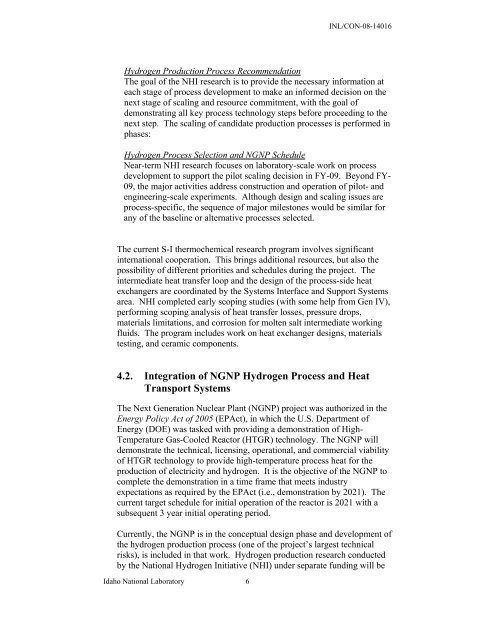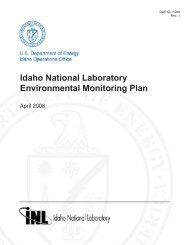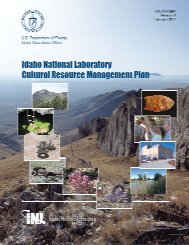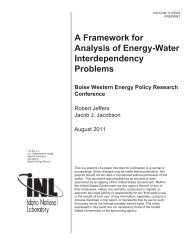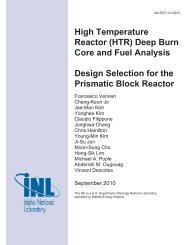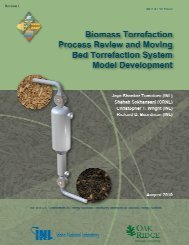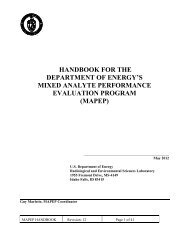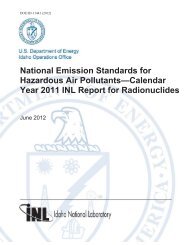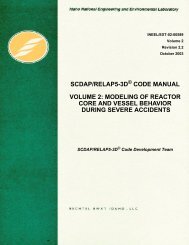Hydrogen Production from the Next Generation Nuclear Plant
Hydrogen Production from the Next Generation Nuclear Plant
Hydrogen Production from the Next Generation Nuclear Plant
You also want an ePaper? Increase the reach of your titles
YUMPU automatically turns print PDFs into web optimized ePapers that Google loves.
INL/CON-08-14016<br />
<strong>Hydrogen</strong> <strong>Production</strong> Process Recommendation<br />
The goal of <strong>the</strong> NHI research is to provide <strong>the</strong> necessary information at<br />
each stage of process development to make an informed decision on <strong>the</strong><br />
next stage of scaling and resource commitment, with <strong>the</strong> goal of<br />
demonstrating all key process technology steps before proceeding to <strong>the</strong><br />
next step. The scaling of candidate production processes is performed in<br />
phases:<br />
<strong>Hydrogen</strong> Process Selection and NGNP Schedule<br />
Near-term NHI research focuses on laboratory-scale work on process<br />
development to support <strong>the</strong> pilot scaling decision in FY-09. Beyond FY-<br />
09, <strong>the</strong> major activities address construction and operation of pilot- and<br />
engineering-scale experiments. Although design and scaling issues are<br />
process-specific, <strong>the</strong> sequence of major milestones would be similar for<br />
any of <strong>the</strong> baseline or alternative processes selected.<br />
The current S-I <strong>the</strong>rmochemical research program involves significant<br />
international cooperation. This brings additional resources, but also <strong>the</strong><br />
possibility of different priorities and schedules during <strong>the</strong> project. The<br />
intermediate heat transfer loop and <strong>the</strong> design of <strong>the</strong> process-side heat<br />
exchangers are coordinated by <strong>the</strong> Systems Interface and Support Systems<br />
area. NHI completed early scoping studies (with some help <strong>from</strong> Gen IV),<br />
performing scoping analysis of heat transfer losses, pressure drops,<br />
materials limitations, and corrosion for molten salt intermediate working<br />
fluids. The program includes work on heat exchanger designs, materials<br />
testing, and ceramic components.<br />
4.2. Integration of NGNP <strong>Hydrogen</strong> Process and Heat<br />
Transport Systems<br />
The <strong>Next</strong> <strong>Generation</strong> <strong>Nuclear</strong> <strong>Plant</strong> (NGNP) project was authorized in <strong>the</strong><br />
Energy Policy Act of 2005 (EPAct), in which <strong>the</strong> U.S. Department of<br />
Energy (DOE) was tasked with providing a demonstration of High-<br />
Temperature Gas-Cooled Reactor (HTGR) technology. The NGNP will<br />
demonstrate <strong>the</strong> technical, licensing, operational, and commercial viability<br />
of HTGR technology to provide high-temperature process heat for <strong>the</strong><br />
production of electricity and hydrogen. It is <strong>the</strong> objective of <strong>the</strong> NGNP to<br />
complete <strong>the</strong> demonstration in a time frame that meets industry<br />
expectations as required by <strong>the</strong> EPAct (i.e., demonstration by 2021). The<br />
current target schedule for initial operation of <strong>the</strong> reactor is 2021 with a<br />
subsequent 3 year initial operating period.<br />
Currently, <strong>the</strong> NGNP is in <strong>the</strong> conceptual design phase and development of<br />
<strong>the</strong> hydrogen production process (one of <strong>the</strong> project’s largest technical<br />
risks), is included in that work. <strong>Hydrogen</strong> production research conducted<br />
by <strong>the</strong> National <strong>Hydrogen</strong> Initiative (NHI) under separate funding will be<br />
Idaho National Laboratory 6


